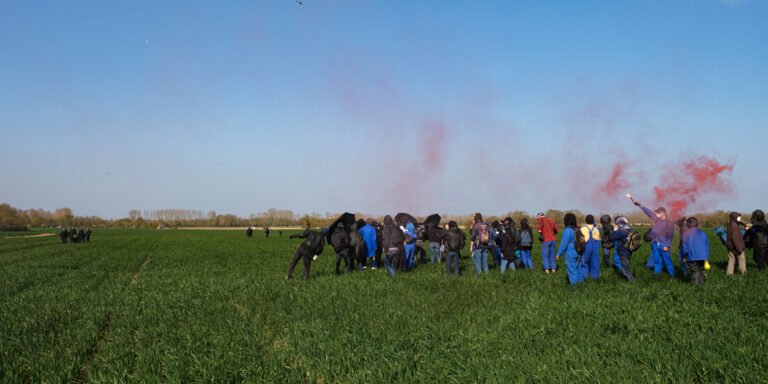
Amid a historic drought, several thousand protesters are preparing Saturday to defy the ban in Deux-Sèvres prefecture to shout their opposition to the “basins” near the construction site of a new water reserve intended for agricultural irrigation. .
Protesters arrived on foot
More than 2,000 people, out of the 10,000 expected by organizers, had already arrived by Friday night, according to Julien Le Guet, spokesman for the “Bassines Non Merci” collective, which brings together environmental associations, trade unions and anti-capitalist groups. in contrast to this “water-grabbing” for “agro-industry”.
Most of the protesters arrived on foot to bypass traffic restrictions in the area and pitched their tents in the camp set up since Tuesday on a field lent by a farmer near the construction site.
“Corn for all, justice nowhere”, we can read on the huge yellow tent that sits in the middle of this camp occupied with barnums, set up by various organizations determined to walk from noon near the construction site for ” the basin”, despite bans on “any demonstration” in several municipalities, including Sainte-Soline, announced on Monday by the prefecture.
Limit possible “acts of violence”
The prefect of Deux-Sèvres Emmanuelle Dubée explained on Friday that she wanted to “limit” possible “acts of violence”, referring to the injuries and clashes between protesters and police that had marred a previous rally in March.
About 1,500 gendarmes have been mobilized, added Ms. Dubée, who predicts “5,000” protesters around this village of about 350 inhabitants, which has become the new epicenter of a conflict over the use of water, which is becoming scarce with global warming.
Sandrine Rousseau on the spot Saturday morning
About 200 elected officials, lawyers or professors condemned a violation of “the fundamental freedom to demonstrate” in a column published by Liberation. Among the signatories, elected rebels or environmentalists such as Mathilde Panot, Clémentine Autain, Alexis Corbière or Yannick Jadot announced on the spot on Saturday.
Sandrine Rousseau was also there on Saturday morning, an AFP journalist noted.
The Sainte-Soline reserve is the second of 16 replacement reserves at the heart of a project drawn up by a group of 400 farmers united in the Coop de l’eau, to “reduce water withdrawals by 70%”, in this region which still experiences irrigation restrictions after an extraordinary summer drought.
“The opponents condemn something that is right”, according to Béchu
These open-air craters, covered by a plastic sheet, are filled by pumping water from the surface groundwater in winter and can store up to 650,000 m3 (i.e. 260 Olympic swimming pools). This water is used for irrigation in the summer, when rainfall is less.
Opponents condemn “megabasins” reserved for large export-oriented grain farms and defend the implementation of other measures to better share and conserve water – agroecology, changing crops, the return of grasslands…
The Minister of the Ecological Transition, Christophe Béchu, assessed on Saturday at France Inter that the opponents “condemn something fair, the need for us to reduce together, and the farmers too, our use of water”, but stressed that a study published in July had “come to say to what extent the project did not have negative consequences for the water table”.
“Strong concern” by farmers
According to this study by the Bureau of Geological and Mining Research (BRGM), compared to the period 2000-2011, the project could increase “by 5% to 6%” the flow of rivers in summer, against a decrease of 1% in winter without taking into account for the potential evaporation of future reserves or the threat of recurrent drought associated with global warming.
Mr. Béchu also recalled that “the plan signed by everyone four years ago” after long consultations between farmers, elected officials, authorities and associations made access to water conditional on changes in practice (reduction of pesticides, planting of hedges, conversion to agroecology). ).
But out of ten farmers using the first deduction, “no one has subscribed to a pesticide reduction”, according to Vincent Bretagnolle, agroecology specialist at the CNRS in Chizé (Deux-Sèvres) and member of the scientific and technical monitoring committee (CST) of the project, and since signing, several associations have withdrawn from the protocol.
Denis Mousseau, president of FNSEA 79, which defends this storage project, reminded AFP on Thursday of the “strong concern” of local farmers at the call by “civil disobedience” organizations.